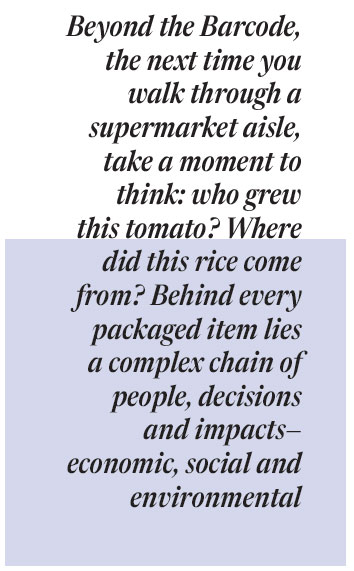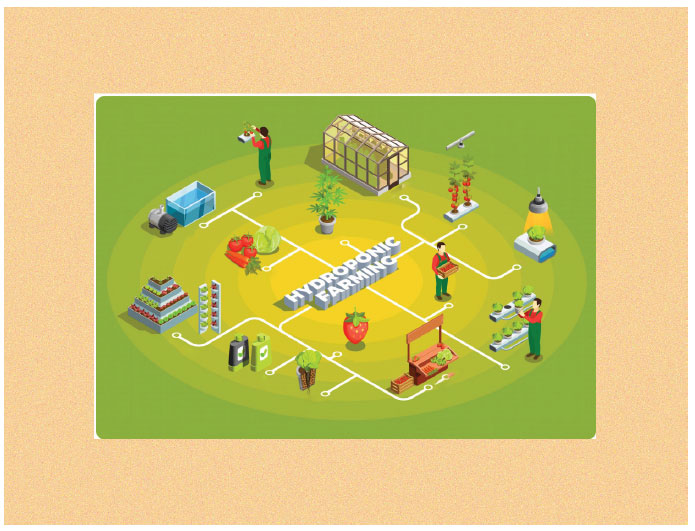
DR M JAMAL UDDIN
Not so long ago, our food journey began and ended close to home. Farmers grew rice, vegetables or fruits on small plots of land, sold them in local bazars, and families cooked what the season provided. Every meal carried the story of a farmer, a village and a tradition. But over the past few decades, this simple, intimate food chain has been replaced by something much bigger, and far more complex.
Small-scale farming to agribusiness: Large corporations managing thousands of hectares of land, processing plants and supply chains that stretch across continents. Alongside, traditional markets are being replaced by air-conditioned supermarkets, with shelves full of packaged and imported goods. This shift has transformed not only what we eat but also how we eat, what we value, and how our communities function. Let’s explore how this evolution affects food culture, cost and community life, and what it means for our future.
From Plough to Agribusiness: Agriculture was once rooted in family labour and local knowledge. Farmers sowed seeds passed down through generations, maintained mixed cropping systems and produced primarily for local markets. Their success depended on rainfall, soil fertility and communal cooperation. Today, agriculture is increasingly treated as a business venture rather than a way of life. Agribusiness companies – often national or multinational – manage every step: from seed to supermarket shelf. They produce hybrid or genetically modified seeds, supply fertilisers and pesticides, run mechanised farms, and control food processing and distribution networks.
In Asian and African countries, agribusiness has entered even staple crops such as rice, maize and vegetables. Contract farming, large-scale mechanisation and vertical integration have become common. While this shift brings efficiency and higher yields, it also concentrates power in fewer hands.
Small Farmers’ Struggle to Survive: For millions of smallholders, this new system has brought uncertainty. Large agribusinesses can produce at lower costs due to economies of scale, modern irrigation and advanced logistics. Small farmers, working with limited land and capital, find it difficult to compete. Many become contract farmers, growing specific crops for agribusiness companies under strict agreements. While this can guarantee buyers, it often leaves farmers vulnerable to market fluctuations, price manipulation and rising input costs. Others abandon farming altogether, migrating to cities in search of work.
Social Cost: Traditional farming knowledge is disappearing; rural youth are losing interest in agriculture; local seed diversity and food varieties are declining and when farming becomes a corporate business, the farmer – once the heart of rural life – turns into a mere labourer in a vast commercial chain.
Supermarkets (New Food Hubs): Supermarkets represent the other face of this transformation. They are convenient, bright and efficient, offering everything from local vegetables to imported cheese, all under one roof. In cities across South Asia, supermarkets like Shwapno, Agora or Meena Bazaar have replaced the noisy, muddy wet markets that once defined daily life.

They are designed for the modern consumer in urban, busy and quality-conscious. But behind this glossy convenience lies a deeper change in how we relate to food. In traditional markets, buying food was a social experience. People chatted with familiar vendors, touched and smelled produce, bargained over prices, and maintained relationships built on trust. Supermarkets, by contrast, replace human interaction with labels, scanners and silent aisles.
Losing the Local Flavour: Our food culture reflects who we are— our history, geography and climate. The shift to agribusiness and supermarkets has gradually eroded this local identity. Traditional crops like millets, indigenous vegetables and heritage rice varieties are disappearing and replaced by uniform hybrids designed for mass production. Supermarkets reinforce this homogenisation. They promote “standardised” foods with consistent shapes, colours and packaging. Imported goods often replace local produce, changing diets and tastes. Fast food, frozen meals and instant mixes are becoming staples of urban life.
The Result: A globalised palate, but a lost connection to the soil. This change is not only cultural but also nutritional. Traditional diets rich in fibre, greens and local grains are being replaced by processed, calorie-dense foods, contributing to rising obesity, diabetes and heart diseases worldwide. In essence, while agribusiness feeds the world efficiently, it also risks making our diets and our identities-bland and uniform.
Cost of Convenience: At first glance, agribusiness and supermarkets seem to make food cheaper and more accessible. Large-scale production lowers per-unit costs, and supermarkets offer discounts that small shops cannot match. But when we look closer, the real cost tells a different story. Here are some hidden environmental costs such as intensive monocropping depletes soil, pollutes water and accelerates deforestation. Chemical fertilisers and pesticides harm ecosystems and public health.
When small farmers lose their land or migrate, rural communities weaken. Local economies dependent on farming collapse leading to urban overcrowding and unemployment. Agribusiness giants capture most of the profit, while farmers and labourers remain underpaid. Even supermarket chains often squeeze suppliers for lower prices, creating a “race to the bottom”. Supermarkets’ dominance can lead to price manipulation. Once small markets disappear, consumers lose bargaining power and choice. So, while the system looks efficient, it often shifts costs from corporations to society-- to our environment, our farmers and our health.
Community and Connection: In traditional food systems, community was central. Neighbours shared seeds, helped each other during planting and harvest, and celebrated festivals tied to crops and seasons. Food connected people – from farmers to consumers – through bonds of trust and mutual support. Today, the food chain has become longer and more impersonal. We no longer know who grows our food, where it comes from, or what chemicals it carries. Supermarkets replace farmers’ faces with barcodes; local markets with corporate logistics centres. This disconnection weakens community ties and reduces our sense of responsibility towards local producers and the environment. The transformation of food systems, thus, represents not only an economic or agricultural shift but also a moral one.
Changing Roles of Women and Youth: In small-scale farming, women traditionally played vital roles- from seed preservation to food processing and marketing. The rise of mechanised, large-scale farming has often marginalised these roles, concentrating decision-making in corporate or male-dominated spaces. At the same time, rural youth increasingly migrate to cities, discouraged by low incomes and uncertain futures in farming. Agribusiness and supermarkets rarely create equal opportunities in rural areas. As a result, rural communities are aging, and agricultural knowledge is fading.
However, this transformation also brings new possibilities: women-led agripreneurship, youth participation in agri-tech, and value-added food enterprises that connect local production with modern markets. The challenge lies in ensuring inclusiveness and fair benefit-sharing.
Environmental Concerns: Large-scale agribusiness depends heavily on chemical fertilisers, synthetic pesticides and fossil fuels for transport and storage. This industrial approach contributes significantly to greenhouse gas emissions, water pollution and soil degradation. Moreover, monoculture systems reduce biodiversity, making crops more vulnerable to pests, diseases and climate shocks. The loss of traditional seed varieties limits farmers’ adaptability and resilience.
Supermarkets also contribute indirectly to food waste and packaging pollution. Pre-packaged goods, plastic containers and transportation from distant sources all add to the ecological burden. In contrast, small-scale, diversified farming systems tend to be more sustainable and climate-resilient, though less profitable in the short term. Balancing efficiency with sustainability remains one of the biggest challenges of modern agriculture.
Way Forward: The shift from small-scale farming to agribusiness is not inherently evil; it has helped feed billions and reduce hunger. The problem lies in how the system operates: prioritising profit over people and productivity over sustainability. To build a fairer and healthier food future, several steps can help restore balance: support smallholders through provide fair prices, credit access and training in sustainable farming; promote local markets by strengthening farmers’ markets and community-supported agriculture (CSA) to reconnect producers and consumers; encourage sustainable agribusiness through incentivising companies to adopt eco-friendly, inclusive practices; preserve food culture through promoting local cuisines, traditional crops and seed diversity through education and media; build consumer awareness about responsible shopping- choosing local, seasonal and fair-trade products, and finally adopting policy reform i.e. governments must regulate monopolies, protect small farmers’ rights, and ensure food security for all.
A Personal Reflection: Beyond the Barcode, the next time you walk through a supermarket aisle, take a moment to think: who grew this tomato? Where did this rice come from? Behind every packaged item lies a complex chain of people, decisions and impacts— economic, social and environmental. We cannot turn back the clock to a purely small-scale farming era, nor should we romanticise rural poverty. But we can strive for a food system that blends the best of both worlds: the efficiency of modern agribusiness with the ethics and intimacy of traditional farming. Food is more than just a commodity; it is culture, connection and community. If we lose that understanding, we risk losing not only the taste of our local dishes but also the soul of our societies.
The story of food is the story of humanity. The shift from small-scale farms to global agribusiness and supermarket chains mirrors our broader transition from local to global, from personal to industrial. It has not only brought progress and convenience but also alienation and inequality. To preserve the richness of our food heritage while feeding a growing world, we must rethink how we produce, distribute and consume food. The goal should not be to reject modernity, but to humanise it to make our food systems more just, sustainable and connected. Because ultimately, a truly developed nation is not measured only by how much food it produces, but by how fairly and meaningfully that food nourishes its people.
_______________________________________________________________
The writer is Principal Scientific Officer, Farm Research Division, BARI and Former National Consultant, FAO, United Nations.
He can be reached at [email protected]

